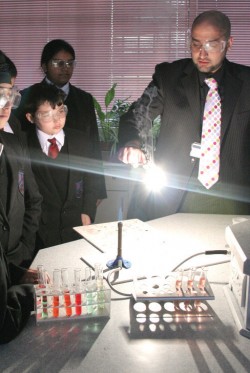The transition from KS3 to KS4 can often be as difficult for parents as pupils. At primary, parents often spend a good deal of time on the school grounds, with regular face-to-face contact with teachers and other parents; so when their child starts secondary school (and begins to travel there independently), they can suddenly feel excluded, with chances to talk to staff seemingly few and far between.
This is at a time when children are becoming less forthcoming with information about their classroom experiences anyway. As a parent of a child in secondary school, I have experienced the same frustration as other parents, feeling slightly detached from my son’s education and questioning whether his school are providing me with enough information.
Getting parents involved in their child’s secondary education can improve the family’s relationship with the school, as well as increasing their child’s enjoyment and chances of doing well. The National College explored this effect on achievement at sixteen years old in English and maths, and found that very high parental interest was associated with better exam results.
At Featherstone High School, where I am deputy head, parental engagement has had a significant positive impact on our school performance. Situated in a deprived part of Southall with 1460 11 to 18-year-olds on roll, we see high levels of socio-disadvantage with a third of students receiving free school meals. Ninety per cent of students speak English as an additional language.
Lost in translation?
Parents who speak English as a foreign language can be the most difficult for schools to communicate with, so finding a way around this barrier must be a top priority. With over thirty languages spoken by parents, one of the things we need to do at Featherstone is ensure that we have members of staff who speak the languages too. Our receptionist, for example, can speak Indian and Pakistani. Interpreters attend parents meetings, which helps enormously.
We have also tried to support parents by allowing them to consult information about the school in their own time. One of things we do is to put a lot of information in plain English about the curriculum, teaching methods and exams on our website – parents have time to unpick the information available and understand more about what their child is doing at school, which helps them support their learning. This applies to all parents and not just those for whom English is not the first language.
The more you know…
If parents are made aware about how their child is doing at school, they are encouraged to share what they learn with their offspring. This is why in addition to curriculum information, we give them as much information about their child’s school life as we can. To ensure that we can supply parents with what they need to know, we have established an effective way to track, monitor and record every child’s progress. All our teachers record attendance, assessment and behaviour data during each lesson on our SIMS management information system via laptops or classroom computers.
As soon as a child joins the school, we can establish a clear starting point by inputting all achievement data from his previous school on to the system, allowing us to set realistic targets for each individual.
Instant access
In 2008, we launched the SIMS Learning Gateway to provide parents with round-the-clock online access to the information we enter on to our SIMS system. This enables parents to log on from anywhere to see their child’s attendance, behaviour and assessment records.
We simplify how the results are presented, avoiding use of ‘teacher language’. For example, we have three levels of colour coding: if maths GCSE progress is shaded in green, the parents will know that their child is achieving at or above her expected level. Red will indicate that she is achieving one grade or more below her expected level.
For parents of children in year 7, the SIMS Learning Gateway has really helped with the transition. “When my son joined in year 7, Featherstone launched the Gateway, which I thought was great,” says a parent at the school. “I was able to check that he’d arrived safely at school on the gateway without having to call in. It helps open a dialogue with my son. I could see the positive points of his day at school so that when he got home, I could say to him ‘wow, that’s fantastic, well done’ and talk about what he’d done that day.”
Students at the school know that their parents are keeping an eye on them. “I think it’s a really good basis for students because they know that we’ve got a finger on the pulse, so to speak, and there’s no pulling the wool over our eyes,” adds the parent.
On our school website, there is a guide to using the Gateway in several languages to help parents access what they need.
It’s good to talk

While technology has been an important part of our parental engagement process, face-to-face meetings continue to be a priority. Parents are invited in to school three times per year to discuss their child’s progress. With access to their child’s reports online via the Gateway, parents are very well informed, enabling conversation to flow. As one parent said to me, “I can see all the levels he achieved before I see the report so it gives me a chance to assimilate the information before a meeting.”
In addition, we have a strong team of learning mentors at the school. They visit parents if necessary, and this has had a significant impact on some of our pupils. For example, one of the boys that I teach had a background of low attainment and bad behaviour. His learning mentor visited his home to talk through the issues. Through this close one-to-one contact with the parents, a plan was made to help him catch up in subjects and motivate him to improve his behaviour. With his parents involved and able to access up to date information online about how he was doing, he was more forthcoming with information about his progress. He is now on course to achieve straight As and has a place at a top university.
Our students are making excellent academic progress – 80% achieved five A*-C grades at GCSE in 2011, and our sixth form was placed in the top 1% for progress last year following exceptional results. I always think that attendance is the biggest indicator of pupils’ happiness at school. An increase from 94 % to 96.9% has given us the evidence we need to back up more anecdotal evidence that getting parents more involved has extremely positive connotations.
Featherstone High School is an academy specialising in the sciences and sport. it promotes the ‘accelerated learning cycle’ model of learning, encouraging student motivation and achievement by providing proven lifelong learning skills.
About the expert
Neil Bradford is Deputy Head Teacher at Featherstone











School profile location: Southall pupils: 1460